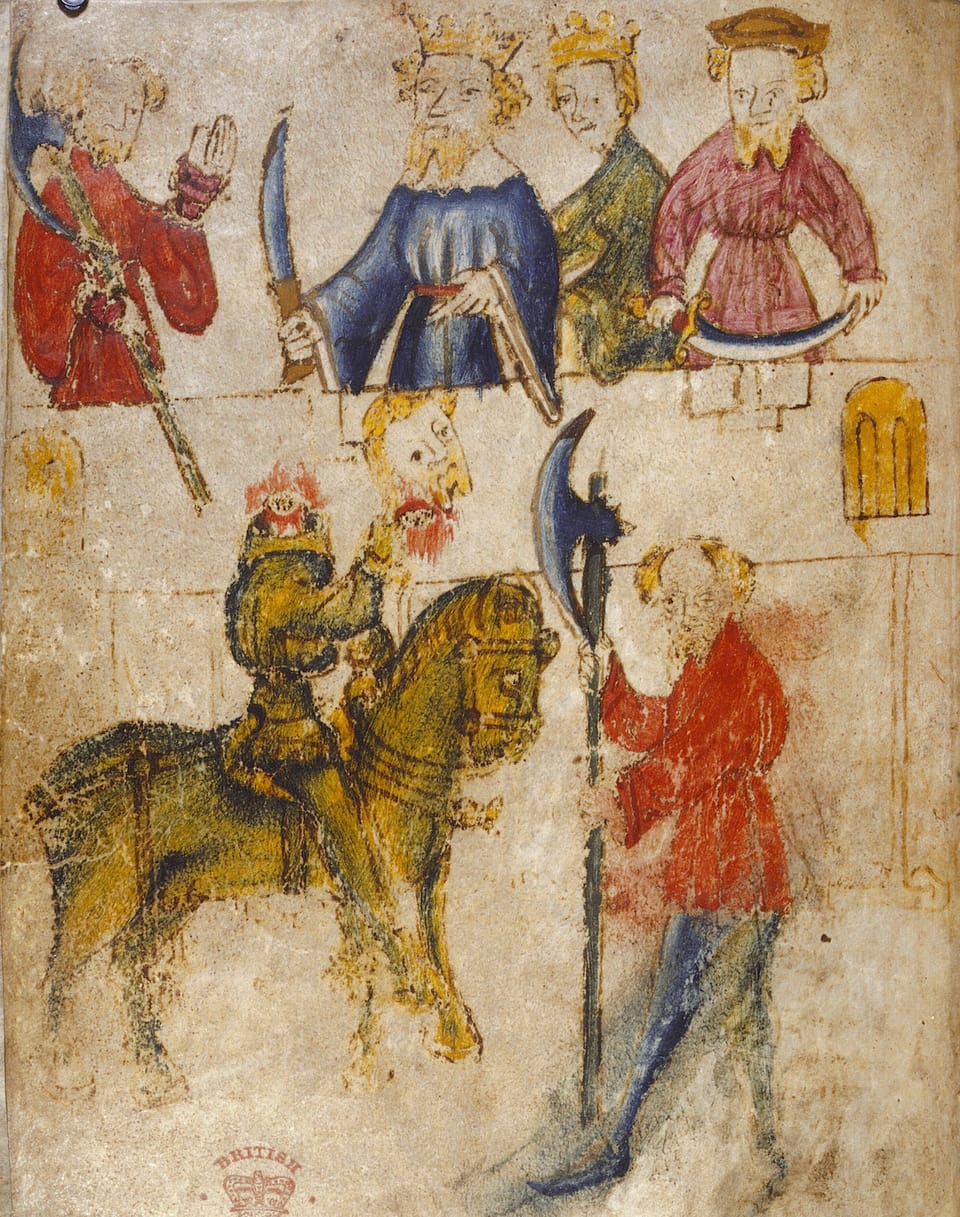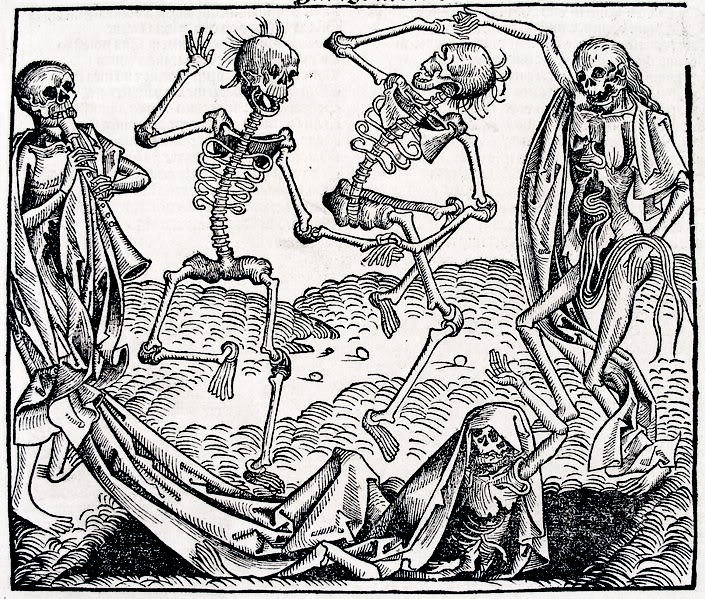Full Moon: New Year's, old ways

It's Friday, and it's nearly the New Year. Hello.
For me, having spent the last six or so years measuring ritual time's changeover on the September equinox, I've found myself increasingly failing to recognize much of a change between December 31st and January 1st, except for changing the calendar. This isn't the season when I make resolutions, which I prefer to do on the respectively destructive and generative days of Calan Gaeaf (Samhain) and Calan Mai (Beltane), depending on whether I plan to get rid of something or take something on. And perhaps all of this should satisfy my younger self, who in early childhood found New Year's Eve an oddly frightening occasion — concerned by the finality of one year dying and linear time marching inexorably onward. I wish that child had known about circular time.
So the New Year should mean little to me. Indeed, I frequently insist on specifying that it's the New Gregorian Year; besides my household's own ritual distinction, there are so many other new year observances to account for worldwide, such as:
- Rosh Hashanah
- Contemporary Celtic-influenced neopagans who treat Samhain as the New Year
- The lunisolar Chinese/East Asian New Year
- Nowruz and other March equinox New Years (including Thelema's)
- The New Year marked by the Sun entering Aries on the sidereal zodiac (common on the Indian subcontinent)
- The first day of Muharram on the Islamic lunar calendar
Beyond all these examples, the Gregorian timekeeping system is only one of two dominant Christian systems. Its complex history should be all the more cause to remember that chronology is a fluid construct. I should have no use for the upcoming New Year.
And yet —
I've instead spent the last decade or more learning to appreciate this New Year as a matter of ritual importance, even if it isn't a holiday equal to those on the Wheel of the Year. This education began when I fell in love with and eventually married someone whose favorite celebration was New Year's; and in the course of studying pre-modern British folk traditions as a plank in my ritual platform, I've become well-acquainted with how historical New Year practices in Britain and across Europe have served an important pagan preservative function, given anglophones a lot of what we now imagine to be "Christmas" traditions — and retain a great deal of animist potential even today.
The following post is going to be more didactic than reflective, and like others I've written in this vein it owes a great deal to the work of genuine historian Ronald Hutton's Stations of the Sun. It will also retread ground already covered in last year's winter solstice post and the post I just wrote last week. However, if that subject matter has interested you so far, consider this a lengthy, enthusiastic footnote that also turns away from the already-answered question of "is Christmas a pagan winter solstice festival in disguise?" (again, not quite) and instead toward the much more obviously pagan festival that happens one week later.
The feast of Janus
According to Roman lore, though not yet confirmed with any preserved calendars from so long ago, the people and institutions of early Rome originally celebrated the New Year on what they reckoned as March 1st, when there were ten months: March through December[1]. By the time that Rome threw out its kingship system and established the better-known Republic, twelve months had been added to make seasonal timekeeping more consistent; but though these were January and February, they still spent some time at the end of the year. And while January had a fixed number of days, February would fluctuate considerably due to various corrections or leap day systems that were used over ensuing centuries.
Despite the purification holidays that took place in February, it might have had the feeling of a month that people simply tolerated. During years in which February was reckoned at 28 days, this made it an unlucky month as all other months at that time had an odd number of days. In some years the reckoning of days between January 1st and March 1st may well have fallen apart altogether.
Viewing the historical record, it's even difficult to say how long January and February stayed at the end of the year versus moving to the start. Some Roman sources claim the change was made before the Republic, but others contradict this completely. Modern scholars also can't agree. What is absolutely certain, however, is that by Julius Caesar's short regime, January 1st had become the New Year, thus making each year open not with the feast of Mars but the feast of two-faced Janus, god of thresholds. Though I'm hardly a Roman reconstructionist, I have to admit I enjoy this perhaps intentionally liminal premise.
It was with this new state of affairs that Julius Caesar instituted his calendar reform, establishing what we now call the Julian calendar. For some chronologically punishing reading on the minute details of how the Roman calendar worked both before and after this reform, at this point I'll simply link two devastatingly informative Wikipedia articles — but it's worth noting here that although the Julian system would still result in seasonal drift, it was a major advance over the chaos that preceded it.[2] As for how this affected the New Year, now the date was not only January 1st for sure but also relatively firmly anchored near the winter solstice and a couple of imperial-era holidays that also happened in December, like Saturnalia and the feast of Sol Invictus.
If transference of traditions hadn't already taken place, the setting was now right for January 1st and the preceding night to become an occasion of wild revelry and misrule. As the Roman empire painfully Christianized, specific rites for Janus were secularized and seemingly blended with those for Saturn — consider Father Time, the old reaper — and Sol Invictus. Though the pagan gods were being swept away, this basic timekeeping celebration could still non-theistically carry on with ritual gift exchanges, hanging up evergreens, eating sweet food, and anointing commoners as kings.
One might well say it was beginning to look a lot like Christmas. But Christmas was barely established before the Roman empire collapsed, and in the proverbial ashes the Feast of the Epiphany — the revelation of infant Jesus to the magi[3], not Jesus' actual birth — was considered more important.
The Church's unwanted stepchild
The Feast of the Epiphany falls on or around January 6th, depending on specifics not worth delving into here. There are a wealth of traditions associated with Epiphany over the centuries since its establishment; most of them do not date back to the early Middle Ages, but their development speaks to how highly elevated the holiday used to be in that time. Christmas itself arguably rose from ritual obscurity when the Council of Tours (567 C.E.) proclaimed twelve days of Christmas that stretched between Christmas and Epiphany, covering several saints' days and concluding on Twelfth Night.
Within that stretch, the New Year was denoted the day of Jesus' circumcision, as it would have happened a week after his birthday; but this, not Christmas, was undoubtedly a grudging concession to people who enjoyed celebrating the New Year in stridently pre-Christian fashion. Church figures from roughly the 300s to the 1000s continuously decried the New Year observance as unreformed paganism. These complaints not only centered around customs that had persisted since actual pagan time but also on a stubborn fad for performing divination on New Year's Eve and the following morning, and many superstitions that had cropped up around who was good luck to enter your door that day, and so on.
But despite functioning as the unwanted stepchild amid the Twelve Days of Christmas, the New Year carried on. As Prof. Hutton highlights in his research, my Cymric ancestors were well known in medieval times for their favoring of the New Year over surrounding Christian holidays. This seems to have been mirrored by their Saxon and eventually Viking invaders; as I mentioned last week, Germanic peoples observing Yule may have more likely done so in January than in December. But as for the Cymric example, consider the now over-memed Mari Lwyd, the horse skull carried from house to house by revelers goading their hosts into singing contests; this originated for the New Year as well, not Christmas or (to our knowledge) the preceding solstice. Likewise, Arthurian and related Cymric literature tends to set important gatherings on the New Year, too.
Ultimately, the Church would complain less about these habits, but it wasn't through successfully convincing British people and their neighbors to give up the New Year or strictly observe it with reverence for Jesus' severed foreskin. Instead, more evolutions happened. Some New Year's traditions shifted over to Twelfth Night and Epiphany; others to the increasingly popular Christmas; and others to both. Though the practices still had non-Christian origins, perhaps they were acceptable now that they were linked more firmly with major Christian feasts on par with Easter. And in the case of Britain, the New Year itself was not forgotten, but a tidy workaround was arranged as the Crown's administrative New Year was moved to March 25th in the year 1155.
Lady Day, dying on the Julian hill, and ironies of modernity
March 25th already had relevance as the Feast of the Annunciation, or Lady Day: the day in which Gabriel appeared to the Virgin Mary and informed her she would be the mother of her god's son. It was from this date, established very early on in Church doctrine, that the date of Christmas was calculated to fall nine months later. And besides the 25th itself, March was still remembered by medieval Rome-adulators as the first month of the year in the oldest Roman styling. So in Britain, the King of England had his cake and ate it, too: the pagan Roman New Year associated most with the worldly excess of the fallen empire was rendered chronologically irrelevant, but the more noble associations of Rome were preserved with a Christian twist.
A lot of anglophones today, even in Britain, are not aware that March 25th was the New Year in our cultural lineage for six hundred years, but it was.[4] Though January 1st celebrations weren't eradicated altogether, that day was considered for those centuries "the Old New Year," a queer little antiquity. All the easier for its traditions to be shifted over to Christmas and Twelfth Night. During spates of Puritan or otherwise rigidly ascetic Protestant repression, of course, the traditions' pagan associations were dredged back up and used to discourage or even ban the holidays they were now associated with. In the mid-1600s, Christmas was illegal on British soil.
The commitment to March 25th as the New Year did not link directly to the choice to refuse the Gregorian calendar, but a certain ornery anglo-exceptionalism might be seen in common between these things. Even when the Gregorian calendar reform was accepted by many European countries to account for how wildly the reckoning of Easter had drifted — among other problems — England and the eventual United Kingdom turned up its nose and stayed with the Julian calendar, affecting all its colonial holdings in the process. So not only was the anglophone New Year out of step with most other European nations[5], but it wasn't even happening in March by those nations' reckoning; from the perspective of France, England was marking the New Year in April.
It was undoubtedly a mess, and in addition to ongoing seasonal and ritual drift, by 1752 it was apparently seen as untenable to maintain the Julian calendar when surrounded by trade partners on the Gregorian. That year, the United Kingdom and its colonies finally cut loose the Julian system. And for maximum alignment, they also returned the New Year to January 1st. I wonder how many people living in the United States have thought about how virtually all of the "Founding Fathers" lived through this calendar change.
In any event, the Old New Year was back to just being the New Year for my ancestors. But after six hundred years, it had certainly been pillaged. Since then, its reputation has been mixed in the dominant anglophone culture. What's left of the New Year can seem like a lesser followup to Christmas, and not a child-friendly one — what with staying up past midnight and drinking copiously — thus hard to incorporate into family rituals, although my owner's teetotaling family still proves otherwise. New Year's Eve can also be a deeply unpleasant night for people who are sensitive to or trauma-activated by the now popular fireworks. Some people, myself included, also feel borderline superstitious about driving after dark that night, convinced that everyone else on the road is inebriated. And for each person who uses the New Year as a chance to take stock and make bold plans for the next twelve months, there is someone else who looks back at the previous year, mourns the ways in which they believe they've wasted their life, and grows dangerously depressed.
However, as evidenced by the wild celebrations that do take place, the New Year still has its acolytes, and the underlying mood isn't simply capitalist-manufactured festivity. Stripped of its pagan associations, though, it's doggedly secular — or at least perceived so often enough that the New Year became a major holiday in the USSR to intentionally offset Christian ones.[6] But while there's a certain elegance to that inversion, and while I'm quite fond of sweet Russian champagne, in telling my way through the tale of the New Year to this point, I've found myself wondering what has been lost in denying the holiday any (spi)ritual context at all.
Implications for ritualists
I am cautious to urge a straightforward return to New Year celebrations as a Roman polytheist practice. As mentioned already, that sort of paganism is outside my purview. To be quite frank, while I see nothing wrong with ritualists who attempt to revive Roman polytheism, it's one of those reconstructionisms that I feel more discomfort about than others. The Romans were imperialists, appropriators, and culture-killers as much as syncretizers. Fawning worship of their rites bleeds much more directly into fascism than any other neopagan practice I'm familiar with; and it was the Romans who systematically eradicated the indigenous belief systems of my Briton ancestors. Though it's absolutely possible to frame Roman ritual traditions through a dynamic, contemporary animist lens — and for people either descended from Romans or descended from peoples they colonized, I feel as though engaging with that body of knowledge is worthwhile, more than locking it away and forgetting about it — I'm not personally inclined to run pell mell into celebrating the New Year as an explicitly Roman holiday when my own preferred focus is on Celtic or Germanic ways and the things that were birthed from their mingling with the Roman. Not the hegemonic Roman material itself.
But that does nudge me toward the New Year in its medieval manifestation, which arguably exists in even more direct opposition to Christianity, since by then Christianity existed. That tension intrigues me, and though the New Year still feels slightly redundant next to Jól on the Wheel of the Year, my rites have room for lesser — but powerful — observances. I would suggest, maybe, that for those of us ritualists who do not intentionally engage with Roman frameworks but do work with the folk traditions found in the several-times-colonized melting pot of Britain, part of our own decolonial process might be to embrace the New Year a little more each January 1st for these two reasons:
- It is a festival of stubborn pagan, animist endurance, regardless of specific cultural origin.
- It is a time for absolute hedonism in defiance of Christian restrictions. Drink, fuck, and be merry.
With that in mind, I think that if there must be some sort of renewal each New Year's Day, even if it is not a new year, then some alternatives are possible. This upcoming date might be a time not to clean slates altogether, but to refresh existing commitments and bonds, tending to the good relations in our kith and kinship networks. To not start new habits, but to review and update existing ones. To not take on new ways, but to restore old ones.
Happy New Year, I will say in a few more midnights, and kiss the man I love in a small but sacred gesture.
[1] July and August also did not have their better-known names, and were called at that time Quintilis and Sextilis, basically the fifth and sixth months, reflected in September through December as the ninth through tenth ones. The names July and August were introduced not during the Julian calendar reform itself, but only a few decades later, when Mark Antony renamed Quintilis for Julius Caesar and then, following Antony's death, in a political countermaneuver Sextilis was then given to his rival Augustus.
[2] Conversely it's worth noting that I don't say this to imply Julius Caesar was a special genius for what he imposed. For one thing, I doubt he came up with the system entirely in his own head, likely relying on knowledgeable astrologers (astronomers) in many respects. For another thing, there have been many relatively serviceable lunisolar calendars that developed before and after (usually before) the Julian solar calendar. The trouble isn't so much that lunisolar calendars don't work, and more that the republican Romans were bad at managing one. The post-republican Romans were bad at managing other things, but I digress.
[3] For the Eastern Church, the Feast of the Epiphany commemorates Jesus' baptism, so there's no infant Jesus business at all.
[4] Speaking as a Tolkien enthusiast, I am obligated to mention down here that it's not an accident the One Ring is destroyed in The Return of the King on March 25th and subsequently the realm of Gondor declares that to be the New Year of a new era.
[5] In fairness to the rainy isle, they were not the only Julian holdouts in Western Christianity. Various peoples adopted the Gregorian reform piecemeal. But the United Kingdom was among the very last to do so.
[6] Contrasted with what Russians call their Old New Year — which is the New Year as it lands on the Julian calendar, still in use by the Eastern Orthodox Church. As the child of a lapsed Russian Orthodox convert, I actually sometimes have clearer memories of celebrating that New Year in mid-January, feasting on wonderful Russian dishes.
Thank you for reading, and do have a good New Year.
Next week will be a paid post on mortuary arts and sciences, but the following week's post will be both public and extremely important, as I am finally ready to venture into extensive, direct discussion of kink as a liberatory and even necessary foundational force in whatever societies our species can hope to maintain in the time to come.





Member discussion